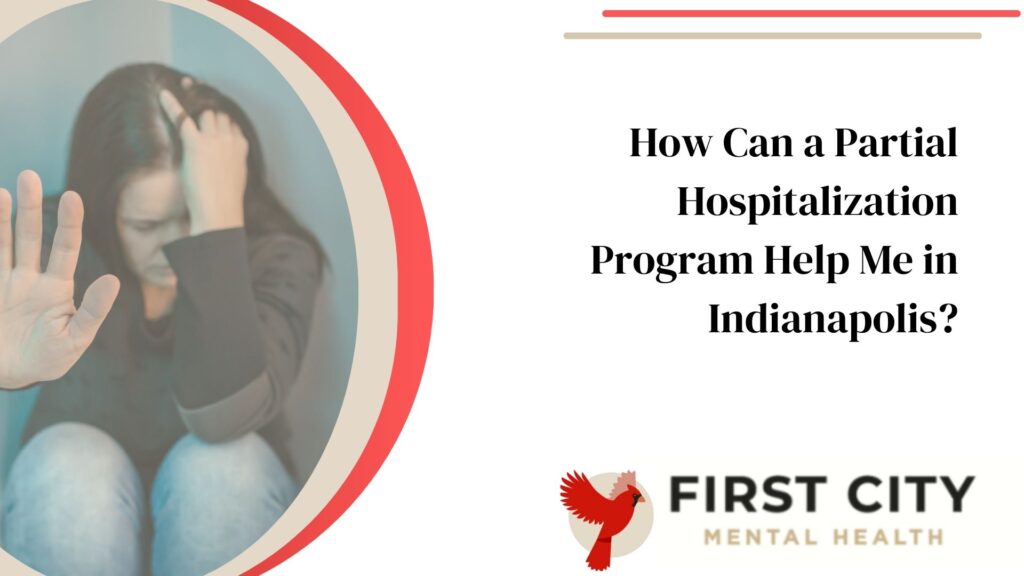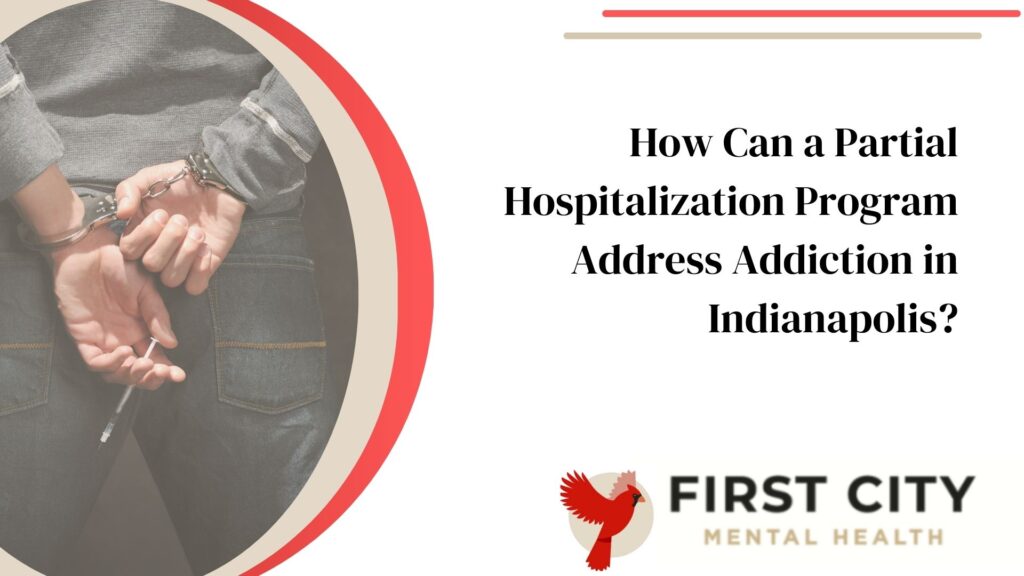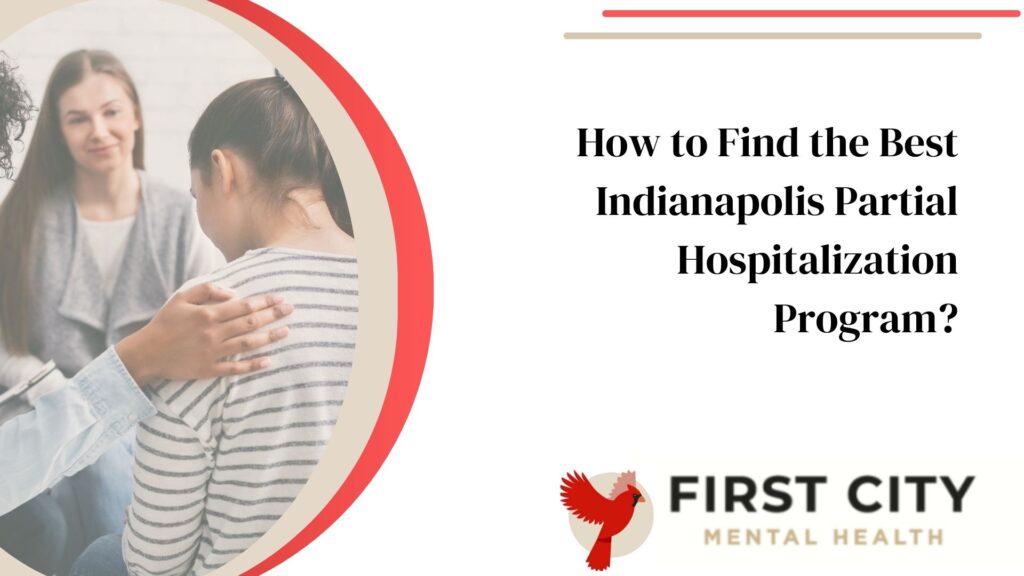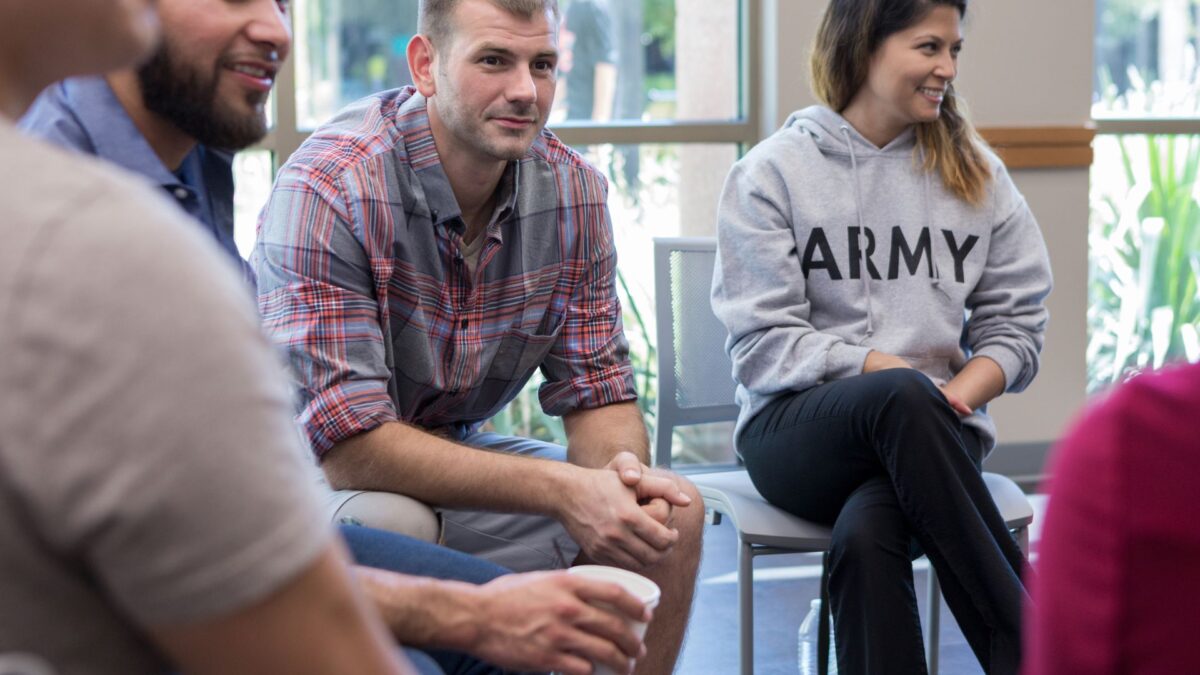
How Do I Enroll in an Adult Partial Hospitalization Program in Indianapolis, Indiana?
January 15, 2025
Why Choose Accredited Centers for Co-Occurring Disorders Treatment?
January 20, 2025Give one of Indiana partial hospitalization programs a shot. They help people such as you find a balance between hospital visits and home life.
These programs provide structured support to address mental health challenges, equipping you with tools to flourish. Escape to an oasis of healing where you don’t have to suffer alone.
Here, you receive expert care without spending the night. These programs make it possible to stay connected to day-to-day life while receiving the help you need.
The advantages of focused mental health care make your path to wellness easy to read. Ready to take the next step?
Key Takeaways
- In Indianapolis, Partial Hospitalization Programs (PHP) provide structured mental health and addiction treatment. Best of all, you don’t have to stay overnight to get this care. This means you can get intensive care while still doing everything you normally do.
- PHPs offer a middle ground between inpatient treatment and outpatient services. They provide flexibility and effectiveness to those who need significant support but not 24/7 supervision.
- These programs treat complicated conditions such as addiction. They offer holistic therapies and support, giving you the tools to manage symptoms and seek recovery.
- In Indianapolis, the length of a PHP typically ranges from a few weeks to a few months. It ensures you get treatment that is tailored to your needs and advancements.
- Many PHPs in Indianapolis provide flexible scheduling. This helps you balance treatment with your personal responsibilities and integrate both into your life.
- Insurance typically pays for PHPs. It’s important to verify these details with your provider so you understand the coverage limits and any out-of-pocket costs you could incur.
How Does an Indiana Partial Hospitalization Program Work?
Envision a Partial Hospitalization Program Indianapolis. You receive an entire day of support and therapy, without the overnight stay. You’ll be in the program three to five days a week. Sometimes, you may even participate for seven days, depending on your needs.
A typical day is around six hours long. During this period, you sit in group therapy for thirty hours a week, with a few hours of one-on-one time sprinkled in. You like the structure of a full-time commitment. At the same time, you gain the flexibility to manage your life outside of it—whether that’s work, school, or family.
Imagine beginning your week on a Monday and going through Saturday with clinical treatment services. This gives you the structure you need and a sense of normalcy and freedom. It means you can keep up with your daily commitments while receiving the intensive kind of care that you need in the city.
The program generally lasts one to three months. This duration allows you to establish a strong foundation for your recovery process.
In the world of PHP, you are not alone. You’ll share group therapy sessions with other people. You can choose to attend meetings like Alcoholics Anonymous or Narcotics Anonymous—all created to support your journey.
These programs have success rates of 70% or higher, meaning you have a real opportunity for durable sobriety. You take big steps forward, and you’ve got an army in your corner. So make it all fit into your life effortlessly!
How Can a Partial Hospitalization Program Help Me in Indianapolis?

Getting treatment while continuing to live life seems like a juggling act. Fortunately, a partial hospitalization program in Indiana offers a rock-solid plan for dealing with this.
Think about a place where you can receive support but don’t necessarily have to spend the night. That’s what this program is all about. You’re learning new ways of dealing with life on life’s terms. This approach lets you keep your daily life at home, allowing you to practice these new skills in real life, making it easier to manage your day-to-day.
The program offers a structured setup with 25 hours of clinical services per week. This includes one-on-one sessions, group therapy, and psychiatric check-ins. It’s like a toolbelt, but one that fits you perfectly with some supplies.
This program serves as a great “next step” once you’ve completed a residential program. If you’re not quite ready for full independence, this is the right option for you! Evolve Indy’s program specifically has earned a 5-star rating.
Clients often rave about the cozy rooms and the chance to work in a supportive environment that makes them feel at home. They even work with most major insurance companies, so you won’t have to worry too much about the costs.
Consider this program your bridge. It gives you the ability to go from prison to a life that is aligned with your rules. In group therapy, you tell your stories and learn valuable insights from others.
Individual therapy hones in on your unique journey, offering a diverse range of support for your healing process. Evolve Indy knows that everyone’s path is different, so they make sure the program fits your unique needs.
What Is the Difference Between Inpatient and Partial Hospitalization in Indianapolis?
It’s important to understand the difference between inpatient and adult partial hospitalization program in Indiana. That knowledge will allow you to pick the option that works best for you.
Inpatient hospitalization is a full-time commitment. If you’re at high risk of relapse or self-harm, you’ll need ongoing support. Constant supervision can substantially increase your safety. You are in a place where even if support wasn’t there, it’s always available.
Meanwhile, a Partial Hospitalization Program (PHP) offers a different vibe. It’s an outpatient program designed for your convenience. You can live at home while fully participating in mental health treatment, behavioral therapy, or recovery from alcohol and drug abuse.
If you’re balancing work or school, PHP is built for your busy life. It’s ideal for moments when outpatient treatment isn’t sufficient, but inpatient care feels too overwhelming. This creates a sweet spot for many, according to the National Alliance on Mental Illness.
You may have just come out of a period of residential treatment. At this point, you might not be ready to jump back into daily routines. A PHP could be your best friend here; it’s designed to facilitate the transition you’re looking for.
Statistics show that 70% of patients see significant changes in their symptoms. When they leave, they often feel satisfied with the treatment. Unlike inpatient treatment, where you stay overnight, PHPs allow you to return home after a day of structured, intense care.
It’s about finding the right balance—getting the help you need without becoming isolated from everyday life. The typical PHP lasts about eight to twelve weeks, depending on your progress and needs. Think of it as a bridge between inpatient care and regular outpatient sessions. This structure allows you to shift easily into a routine that fosters your recovery path.
How Can a Partial Hospitalization Program Address Addiction in Indianapolis?

Say you’re struggling with addiction while raising a family and holding down a job. It’s hard. That’s where a Partial Hospitalization Program PHP comes in, providing a supportive and structured space. You get the intensive care you need without leaving your daily life behind. It’s like walking a tightrope with a safety net.
The magic of PHPs is that they are an all-rounder. They combine substance use treatments, such as detox and Medication-Assisted Treatment (MAT), with mental health therapies. This includes counseling and medication for a more comprehensive approach.
This combo is vital because addiction often accompanies mental health struggles. It’s not just about quitting substances; it’s about healing all around.
If you’ve completed residential treatment, PHPs may be your next step, transitioning you back into your daily life. Studies back this up, showing patients in PHPs experience better symptom improvements and are happier with their treatment.
In a study with 206 patients, many participants completed the PHP program sober. They also had a good understanding of how to be safe and happy without drugs.
PHPs are a warm hug compared to cold hospital settings. They provide various therapies, including one-on-one and group support, ensuring you find the ideal fit. It works—it makes an 80 percent improvement in the lives of people in PHPs.
What is the Time Limit for PHP Programs in Indianapolis?
If you’re considering a Partial Hospitalization Program (PHP) in Indianapolis, you might be wondering how long the process will take. It’s completely natural to have questions about the duration of treatment. Most PHPs run only between 4 and 6 weeks, but that’s not necessarily a hard and fast rule.
You could compare the PHP experience to a trip – the itinerary may deviate from time to time depending on what you learn along the way. For some individuals, a 30-day program is just what the doctor ordered. Others may find that a longer stay (60, 90, or even 180 days) is what they really need to make a significant change. A longer stay can provide the best chance for substantial improvement.
Your treatment plan is like a tailored suit, designed specifically to fit your needs. Your response to therapy and medication management also plays a crucial role in determining the length of your program. Typically, treatment involves a mixture of individual and group sessions. Most people complete their training in 8 to 12 weeks, but some might need a few more weeks before they feel ready to move on.
Learning to ride a bike is a good analogy; it’s something you practice, and some of us just take longer before we can ride without training wheels.
Around 70% of people who finish a PHP program see a significant boost in their mental health. This statistic highlights that patience and commitment really do pay off in the long run.
Does a Partial Hospitalization Program Offer Flexible Scheduling in Indianapolis?
Beginning a Partial Hospitalization Program (PHP) in Indianapolis may sound intimidating, but the process is highly flexible. This flexibility makes the whole transition much easier and more manageable!
Picture this: you attend group therapy sessions five days a week, each lasting at least three hours. It sounds like a lot, right? Here’s the thing—these sessions fit into your life, allowing you to continue to work or attend school. Imagine getting the support you need while juggling your daily routine.
PHPs usually operate three to five days a week. Some even offer treatment every day of the week! This structure serves as a safety net, enabling you to manage the demands of life effectively.
This flexibility is especially significant if you’ve completed residential treatment and are reintegrating into everyday life. The beauty of a PHP is that it supports you without completely disrupting your routine. You’re there for most of the day, five days a week, but you still have time for other commitments.
Think of it as a way to maintain your daily rhythm while receiving serious help. The majority of people complete the program within one to three months, with 70% finishing it in just two months.
If you’re balancing school and work, a PHP could be the best option for you. It can help keep you organized and support your success in both areas.
Does Insurance Cover Partial Hospitalization Programs in Indianapolis?
Insurance plays a significant role in your decision when considering a mental health partial hospitalization program in Indianapolis. You may be wondering what insurance actually covers. Many insurance plans cover partial hospitalization, including plans from major companies.
This level of care typically falls under behavioral health benefits. You’ll want to dig deep into the specifics of your plan, though, as coverage varies significantly. For example, some plans pay a percentage of the costs, while others may require a deductible or co-pay. Imagine having a safety net that guarantees your mental health care remains financially manageable. This support enables you to prioritize your recovery journey.
Walking through the insurance market can be a maze, but there are shining lights. Consider calling your insurance company and asking how much they will pay. You might also try contacting the place that offers the program, as most have specialists on hand to explain the details and help you with pre-authorizations.
Imagine having a friendly guide by your side. They can help you navigate every step and ensure you understand your benefits and responsibilities. This proactive approach lifts some of the stress off your shoulders and helps you make informed decisions about your clinical care.
How to Find the Best Indianapolis Partial Hospitalization Program?

Exploring partial hospitalization program mental health in Indianapolis can seem daunting. However, the effort you spend will be rewarded with the business you’ll generate down the road. A good PHP can make a world of difference. You, or your loved one, will be there for a long time — maybe a few months.
Think of it as a bridge. It smooths the transition from residential treatment into the hustle and bustle of daily life. You want a program that truly resonates with you. It needs to be agile enough to accommodate your personal preferences while providing enough structure for good support.
Indiana has a selection of PHPs that are less expensive than you might expect. It’s about where you fit in there. Consider what therapies and treatments are offered, and don’t be hesitant to inquire about success rates. After all, about 70% of people who complete a PHP report significant improvements in their symptoms and quality of life.
Another important step is to check the credentials and experience of the staff. They’ll walk you or your loved one through this process. Make sure they know what they are talking about and that you can trust them.
Remember, you’re not alone in this journey. Don’t be afraid to call places like NuLife Behavioral Health. They’re there to talk about your alternatives and make sure PHP is the right direction for you.
Conclusion
You’re trying to solve problems in Indianapolis? Partial Hospitalization Programs Indianapolis may be your solution. They provide a good balance of support and flexibility. You get expert care without turning your life upside down. Imagine having the right folks in your corner, guiding you through rough times. PHPs are all about equipping you with tools and strength to take on what lies ahead.
Want a schedule that jives with your life? PHPs have your back. Just dive in, take that first step, and see what your options are. Are you ready to change the game? Reach out today and get the program that fits your life like a glove. You got this!
Frequently Asked Questions
What is a Partial Hospitalization Program (PHP)?
A Partial Hospitalization Program offers structured, intensive treatment for mental health and addiction issues. Patients go to therapy during the day and go home at night. It’s less strict than inpatient treatment but more supportive than outpatient therapy.
Who is suitable for a PHP in Indianapolis?
PHPs are a good fit for anyone who wants intensive treatment but doesn’t need 24/7 supervision. It’s appropriate for those who are coming out of inpatient care or who need more structure than outpatient therapy offers.
How long does a typical PHP last in Indianapolis?
PHPs typically last between 4 and 6 weeks. How long does it take to complete the entire program? Patients typically participate several hours a day, several days a week.
Can I continue working while attending a PHP in Indianapolis?
Many PHPs offer flexible scheduling. This means people can keep work or family commitments while undergoing treatment. That’s why it’s important to talk with the program provider about scheduling options.
Do insurance plans cover PHPs in Indianapolis?
Most insurance plans cover PHPs. Coverage details depend on your provider, so you’ll want to check before you sign up. Getting to know your benefits could lower your out-of-pocket bill for treatment.






